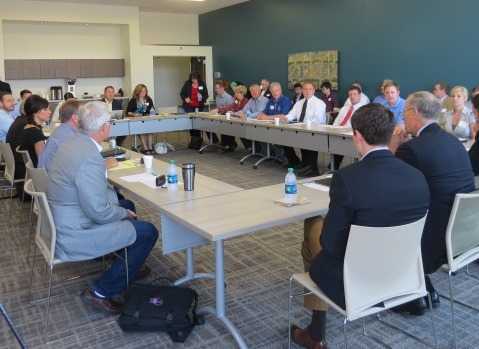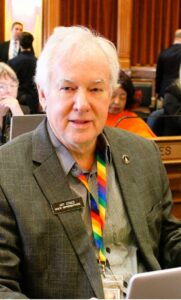Capitol Comments
New Fund to Boost Iowa’s Skilled Workforce
With Iowa facing a skilled worker shortage and most jobs now requiring training beyond high school, the Iowa Legislature took action this year to help many Iowans get the skills they need to land a good paying job and to help employers find and develop well-trained workers through the new Skilled Worker Job Creation Fund.
Available at each of Iowa’s 15 community colleges, including Kirkwood Community College (http://www.kirkwood.edu/), the new fund will help develop training and education programs that focus on critical workforce skills – skills identified and required by local employers in each region. Local networks will work with businesses to identify these specific skilled job shortages and develop training programs tailored to meet the needs of local businesses.
And, for the first time, Iowa is also investing in adult basic education courses for adult literacy and English language learners. The goal is to help adult workers with low-skills and/or with language barriers get the education and training that they need to land a good-paying job or improve their current one.
For workers who need financial assistance to upgrade their work skills, the Legislature also approved grants to train workers specifically for Iowa jobs where there is a shortage of workers and to help need-based applicants enroll in certification or apprenticeship programs.
Connecting to Businesses
Additionally, work-based learning intermediary networks will connect more high school juniors and seniors to job shadowing opportunities. The networks will also provide opportunities for teachers to show how Science, Technology, Engineering, and Math (STEM) education work in Iowa businesses.
State Revenue Collections Top Expectations; Surplus Tops $1.6 Billion
The 2013 state fiscal year ended on June 30th with revenue collections exceeding estimates by more than $212 million and leaving the state with over $1.6 billion in surplus and reserves. The State collected just more than $6.654 billion in revenue for fiscal year 2013, an increase of $532 million, or 8.7%, from the previous fiscal year.
Better than expected revenue growth is one indicator that our economy continues to improve. Iowa’s nonfarm employment, through the end of May, was up 21,700 from the same period a year ago. Iowa’s 12-month average employment still lags behind the employment peak reached in October of 2008, which means more must be done to get the remaining unemployed Iowans back to work in good-paying jobs.
Personal income taxes, the main source of revenues for Iowa, grew $449.6 million for the year, an increase of 12.4%. Corporate income tax receipts grew by 6.6% this year while sales and use tax receipts grew by 1.7%, or $42.3 million.
The extra revenue growth is adding to the state’s already strong budget surplus for fiscal year 2013. While the State won’t officially close the books on the fiscal year until October, the additional revenues are expected to boost the state’s ending balance to a surplus of over $990 million. When this ending balance is combined with the $622 million in the state’s reserve funds, Iowa will have over $1.6 billion in surplus and reserves.
Governor Branstad Vetoes Funding for MH/DS Redesign
Governor Branstad used his veto authority to cut out funds intended to protect mental health and developmental disability services to Iowans, even as the redesign of the mental health system enters its second year of transitions. The Governor vetoed:
- $8.7 million that would have taken thousands of Iowans off Medicaid waiver waiting lists. Already, some counties are providing interim services to individuals while they wait for a Medicaid slot to become available. These dollars could be used to help free up additional matching funds or to pay for other needed services.
- $13 million that would have provided a “risk pool” to help the 45 counties that will be forced to collect fewer dollars locally for MH/DS services, and who have no other source of state funding to balance their budgets. Many of these counties may have to cut services or stop paying providers to survive on this budget reduction.
While the Governor lauded his signing of $29.8 million in funding for non-Medicaid regionally delivered services to people with disabilities, he quietly cut over $21 million in funds that would have stabilized services to Iowans with disabilities. In addition, some of that $29.8 million will need to be repaid, by the counties, to the state next year.
So, as Senator Rob Hogg has similarly done, I ask all of you (Democrats, Republicans and Independents) to continue to advocate for Governor Branstad to commit publicly to immediately support the critical supplemental mental health funding that he vetoed just a month ago:
“Governor Branstad should not have vetoed the $13 mental health at-risk pool that was to provide the critical safety net for counties to avoid cuts in mental health services this year. Counties needing additional funds could have applied to the Department of Human Services for this at-risk funding. Unfortunately, Governor Branstad’s veto took away this mental health safety net that had been provided in a bipartisan bill approved by both the Iowa House and Senate.” – Sen. Hogg
There was no need, nor adequate justification for these cuts. The state of Iowa has more than $1.6 billion in reserves and surplus dollars.
Governor Branstad can reverse this error by immediately and publicly supporting the supplemental funds needed to avoid mental health cuts. Without this action counties across Iowa will be forced to cut back many mental health services that would otherwise have been provided to those in need.
What you can do:
1. Call the Governor’s Office at 515-281-5211 and urge him to publicly support supplemental mental health funding so that counties do not need to make mental health cuts. And ask him to restore these cuts as soon as the Legislative session begins.
2. Write Letters to the Editor of the Des Moines Register (letters@dmreg.com) and/or the Cedar Rapids Gazette (editorial@sourcemedia.net). Explain the need for mental health funding and call on Governor Branstad to fix his veto of the mental health at-risk pool that received strong bipartisan support from both chambers in the Iowa Legislature. Iowans support mental health funding and want Governor Branstad to fix his mistake – his vetoing of these funds.
3. If you write the Gazette, you can also thank the paper for its “One Veto Too Many” editorial published on June 28: http://thegazette.com/2013/06/28/one-veto-too-many/.
As the Gazette stated, “In many parts of the state, local officials are struggling to maintain existing services, which were underfunded even before the redesign” and “his veto means more anxiety and uncertainty for providers and the Iowans who need them.”
These vetoes will undoubtedly result in some setbacks in the redesign of the mental health and disability services system in Iowa and could threaten the stability of the entire MH/DS system.
To read the Governor’s veto messages on these two cuts go to http://bit.ly/13ouXlq (waiver waiting list) and http://bit.ly/17EeWqQ (risk pool).
— Representative Art Staed
Before door-knocking one evening, Susan and I enjoyed hot dogs, lemonade and ice cream at the annual Kenwood Neighborhood Association Social. This event gets larger and better every year, thanks to the many volunteers – and great neighbors who attend!
At the Small Business & Technology Roundtable discussion, hosted by the Cedar Rapids Metro Economic Alliance, the Technology Association of Iowa, the American Advertising Federation: Cedar Rapids – Iowa City, the American Advertising Federation of Dubuque and the Small Business Development Center at Kirkwood Community College with organizational support from Google. We heard personal stories from area business entrepreneurs concerning their unique and vital uses of technology, especially the Internet. This roundtable event provided an opportunity to educate Congressman Bruce Braley and local state legislators on transformative electronic commerce, online advertising and technology sectors, as well as discuss local and national policy issues.
Participated in a groundbreaking ceremony at our Linn County Fairgrounds in Central City. This celebration was for the construction of the Lynn Dunn Memorial Building, in honor of a man whose passion was the Linn County Fair. Mr. Dunn served as a board member for years and with great pride and diligence, held many leadership positions within the Linn County Fair Association. The new building will permit year-round activities including 4-H meetings, receptions, board meetings, etc. Pictured here with fair president, Jennifer Dunn, and building committee members.
Back in Des Moines to attend the Juvenile Justice Reform and Reinvestment Initiative Stakeholder Engagement Meeting (whew, this is why we use acronyms!). The Sixth Judicial District (Linn County) will be part of this initiative to improve outcomes for youth served by the juvenile justice system. This will be a comprehensive, research-based model that has potential for reducing recidivism. The overview was intended to engage stakeholders in the process and to garner support from key officials.
Amy Kuhlers, State Program Director for Connect Iowa, gave an informative presentation on broadband communication in Iowa. Connect Iowa, a non-profit, in partnership with the Economic Development Authority, is working to ensure that all can experience the benefits of broadband. On their web site, you can get state maps, county profiles, interactive maps, data and facts about access, adoption and use.
Local legislators met to discuss strategies and policy for covering the remaining gaps in broadband availability to underserved groups, to businesses and to geographic areas currently without service.
Meeting with the new University of Northern Iowa President, Bill Ruud. Our discussion included: increased enrollment, the base budget, college tuition and coordinated programs with our community colleges. President Ruud brings a wealth of knowledge and experience to the UNI. Welcome, Dr. Ruud!
No official “Art Staed” float this year, but Amanda Pieper of HACAP Food Reservoir invited us to walk with their “Freedom From Hunger” group. Immediately after, we spotted the Sheet Metal Workers’ float take off at the beginning of the parade route. We enjoyed walking and handing out candy on the second round. (Who was it that said “you can only go around once”?)
Read More from the Iowa House
To read the rest of my Statehouse News go to: http://iowahouse.org/StatehouseNews/7-17-13.html















